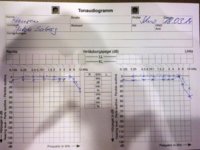For those who are interested in LLLT (in relation to Dr. Wilden's therapy, specifically):
1) Dr. Wilden approaches the functioning of the inner ear and audiology from a biological perspective ie. "does it work ...?"
2) An ENT approaches the functioning of the inner ear and audiology from a practical perspective ie. "can you hear...?"
The difference in the approach means that Dr. Wilden treats hearing loss as hearing which is worse than 10db (at
any frequency). A regular ENT would treat hearing loss typically as hearing which is worse than 25db at
any frequency in the speech frequency range (0 - 8 kHz). As is probably well known to most people on this board, human beings can hear up to about 20 kHz. For this reason, the standard audiometric tests performed by most ENTs (= 0 - 8 kHz) are obviously inadequate. Not even half of the full frequency range is examined. It is equivalent to a cardiologist who examines only the left side of a patient's heart - and based on that - determines whether the right side is also okay...

So in terms of audiology, the work of an ENT has failed before it has even begun. This is also evident from my most recent audiogram which I have previously posted on this board, but which I will attach again here:
View attachment 1636
The day I got the above audiogram done, I specifically had to go to another clinic for the test than the clinic I was already at. Indeed, had I accepted the standard 0-8 kHz test, the ENT would have concluded that my hearing is
perfect. Yet, right after 8 kHz, there is a sharp drop (especially in my left ear). My hearing loss could easily be as much as 60 db at 16 kHz. The aim of my current LLLT therapy is to revisit the therapy I had last year and continue with the LLLT therapy until all of my hearing curve is brought up to approximately 10 db. This may take quite some time. Last summer, I managed to reverse hearing loss of up to 25db in 8 weeks (after which I stopped and went onto stem cell therapy (x 2), instead) . This time I will be continuing the LLLT therapy for "as long as it takes". Since it is another ½ year before my HIFU examination, the surgeon has told me to spend my time wisely (meaning: do what you can in the meantime to get better - in order to ultimately avoid brain surgery). So the aim of my current therapy is to really examine the link between audiograms and tinnitus - when done
properly (ie. 0 - 16 kHz full examination). And to really see how far LLLT can reverse hearing loss. My feeling is that with last year's therapy, I may have quit a little too soon. This time, I am also experimenting with higher doses based on the Arndt-Schulz curve - which I have posted on earlier in this thread. When experimenting with higher doses, it is important to monitor the progress with audiograms closely (to ensure no detrimental effect is taking place). The progress I made last year can be found in the attachment file below. I am also in contact with other LLLT patients - and some of my decision making is based on their feedback.
Lastly, the reason I will not be disclosing my upcoming series of audiograms publicly is because the environment on this board is hostile. By "hostile" I mean the following: I have seen incorrect statements made in relation to LLLT by two members on this board whom I believe are both doctors - one of the statements read as follows:
"Problem is ... the ear canal has twists and turns, the hair cells are in the cochlea which is located at the other end of the ear canal, and the cochlea is encased in bone. So there's no way that the "healing light" can reach its intended target without burning a hole in your temporal bone!"
It is quite easy to disprove such a statement. For a start, one can get an impression by looking up the photos I have posted on this board - at least one can be found in my introduction. If a therapy is a piece of crap, then by all means, say so. But don't start blaming a therapy for the wrong reasons. A laser with the right
wavelength and
strength can reach the cochlea. So the person who made the statement above is either ignorant or is purposely making incorrect statements. In either case, I have no intention in pursuing a discussion with such people. And hence an offline briefing for those who are
serious about LLLT is the right way forward.

 Member
Member Member
Member




